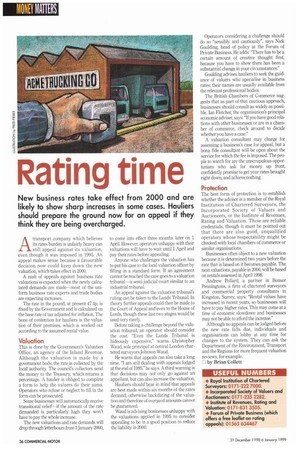Rating time
Page 38

If you've noticed an error in this article please click here to report it so we can fix it.
New business rates take effect from 2000 and are likely to show sharp increases in some cases. Hauliers should prepare the ground now for an appeal if they think they are being overcharged.
Atransport company which believes its rates burden is unfairly heavy can still appeal against its valuation, even though it was imposed in 1995. An appeal makes sense because a favourable decision now could keep down the new valuation, which takes effect in 2000.
A rash of appeals against business rate valuations is expected when the newly calculated demands are made—most of the uniform business rate experts and trade bodies are expecting increases.
The rate in the pound, at present 47.4p, is fixed by the Government and is calculated on the base rate of tax adjusted for inflation. The bone of contention for hauliers is the valuation of their premises, which is worked out according to the assumed rental value.
Valuation
This is done by the Government's Valuation Office, an agency of the Inland Revenue. Although the valuation is made by a government body, the rate is collected by the local authority. The council's collectors send the money to the Treasury, which returns a percentage. A haulier is obliged to complete a form to help the valuers do their sums. Operators who refuse or neglect to fill in the form can be prosecuted.
Some businesses will automatically receive transitional relief—if the amount of the rate demanded is particularly high they won't have to pay the whole increase.
The new valuations and rate demands will drop through letterboxes from 1 January 2000, to come into effect three months later on 1 April. However, operators unhappy with their valuations will have to wait until 1 April and pay their rates before appealing.
Anyone who challenges the valuation has to put his case to the local valuation officer by filling in a standard form. If an agreement cannot be reached the case goes to a valuation tribunal a semi-judicial court similar to an industrial tribunal.
An appeal against the valuation tribunal's ruling can be taken to the Lands Tribunal. In theory further appeals could then be made to the Court of Appeal and even to the House of Lords, though these last two stages would be used very rarely.
Before taking a challenge beyond the valuation tribunal, an operator should consider the cost. "Even the Lands Tribunal is hideously expensive," warns Christopher Waud, sole principal at central London chartered surveyors Johnson Waud.
He warns that appeals can also take a long time. "I am still dealing with appeals lodged at the end of 1995," he says. A third warning is that decisions may not only go against an appellant, but can also increase the valuation.
Hauliers should bear in mind that appeals are best made within six months of the rates demand, otherwise backdating of the valuation and therefore of overpaid amounts cannot be guaranteed.
Waud is advising businesses unhappy with the valuations applied in 1995 to consider appealing to be in a good position to reduce the liability in 2000. Operators considering a challenge should do so "sensibly and cautiously", says Nick Goulding, head of policy at the Forum of Private Business. He adds: "There has to be a certain amount of creative thought first, because you have to show there has been a substantial change in your circumstances."
Goulding advises hauliers to seek the guidance of valuers who specialise in business rates; their names are usually available from the relevant professional bodies.
The British Chambers of Commerce suggests that as part of that cautious approach, businesses should consult as widely as possible. Ian Fletcher, the organisation's principal economic adviser, says: "If you have good relations with other businesses or are in a chamber of commerce, check around to decide whether you have a case."
A valuation consultant may charge for assessing a business's case for appeal, but a bona fide consultant will be open about the service for which the fee is imposed. The people to watch for are the unscrupulous opportunists who ask for money up front, confidently promise to get your rates brought right down, and achieve nothing.
Protection
The best form of protection is to establish whether the adviser is a member of the Royal Institution of Chartered Surveyors, the Incorporated Society of Valuers and Auctioneers, or the Institute of Revenues, Rating and Valuation. These are reliable credentials, though it must be pointed out that there are also good, unqualified operators whose respectability might be checked with local chambers of commerce or similar organisations.
Businesses often object to a new valuation because it is determined two years before the rate that is based on it becomes payable. The next valuations, payable in 2000, will be based on rentals assessed in April 1998.
Andrew Pollard, a partner in Bonsor Penningtons, a firm of chartered surveyors and commercial property consultants in Kingston, Surrey, says: "Rental values have increased in recent years, so businesses will have to pay higher rates. This may come at a time of economic slowdown and businesses may not be able to afford the increase."
Although no appeals can be lodged before the new rate falls due, individuals and organisations can lobby at any time for changes to the system. They can ask the Department of the Environment, Transport and the Regions for more frequent valuation reviews, for example.
III by Brian Collett
USEFUL NUMBERS
• Royal Institution of Chartered Surveyors: 0171-222 7000. • Incorporated Society of Valuers and Auctioneers: 0171-235 2282.
• Institute of Revenues, Rating and Valuation: 0171-831 3505.
• Forum of Private Business (which offers a free leaflet on rating appeals): 01565 634467
































































































